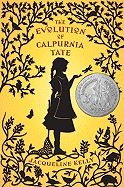

The heroine's observations about two "very different kinds of grasshoppers" lead her to approach her reclusive grandfather, an "old man [with] fierce tufty eyebrows . . . rather like a dragon's." When she poses the grasshopper question to her grandfather, he tells her he "suspect[s] that a smart young whip like you can figure it out" and to report back when she has. Undeterred, she hitches a ride with Harry into town and goes in search of a book she'd heard her minister and grandfather discussing, The Origin of the Species (and what the "unearthing [of dinosaurs] in Colorado . . . meant to the Book of Genesis"). Surely Mr. Charles Darwin's book would hold the answers. Though her trip is unsuccessful, Callie Vee figures out the answer through further study, shares her solution with her grandfather, and a tenuous connection forms between them. The strengthening of their bond forms the heart of this humorous, often poignant book. For Grandfather cares not that Callie Vee was born a girl; he sees her as a companion in a world full of astonishing curiosities. (In one standout exchange, Callie Vee observes, "It's funny . . . that girls have to be pretty. It's the boys that have to be pretty in Nature. Look at the cardinal. Look at the peacock. Why is it so different with us?" And Grandfather replies, "Because in Nature it is generally the female who chooses . . . Whereas your brother [Harry] gets to choose from the young ladies, so they have to do their best to catch his eye.") The tensions in the story arise from Callie Vee going against society's (and especially her mother's) expectations, and from Callie's interference with a courtship between Harry and a girl Callie deems unsuitable. Kelly wisely keeps the ending realistic--after all, Callie lives in a world that places restrictions on her--but readers will believe she can handle whatever challenges may come her way, especially with Grandfather at her side. Callie Vee invites readers to examine the world more closely, for both its natural beauty and for the limits we humans place upon it and each other.--Jennifer M. Brown

